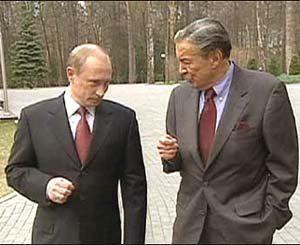 |
International Affairs
Who Is Putin’s God?
Still Unknown after ‘60 Minutes’
Toby Westerman
Russian President Vladimir Putin's relationship with God remains as ill defined as Russia's version of democracy. The question of Putin's faith, or lack of it, is important as an assurance of a final break with Marxism and as an indicator of the future direction of Russia.
In the May 8, 2005 "60 Minutes" interview segment with veteran news journalist Mike Wallace, Putin was only slightly less evasive about faith than he was about the fate of democratic reforms and a free press in the "new" Russia.
In response to a question from Wallace about his family and children, Putin said, "I believe that everything is right which God has given us."

Putin presents a strange notion of his "god" in an interview with Mike Wallace - CBS News, May 18, 2005 |
After Putin used the term "God," Wallace asked he was a "religious man," and Putin replied, "I believe that every person must have some faith within his heart, and this is what is important, your inner world, the condition of your soul."
Left out of Putin's statement was any mention of a link between whatever he considered to be "God," and the individual. There is no hint of intervention of the Divine into the soul, only a series of material events intruding upon an individual's life.
This is not the first time Putin left unanswered the question of his personal beliefs. During a September 2000 interview on "Larry King Live," Putin stated that he had "spiritual feelings," but refused to directly declare a belief in God. "I believe in human beings," and "the ultimate goal of comfort in our own heart," said Putin during the interview, according to Reuters.
Yet, even the Russians are confused.
On October 21, 2004, Joe Adamov, a veteran Voice of Russia news reporter, attempted to answer a question regarding Putin's religious beliefs. Adamov hosts "Moscow Mailbag," a program devoted to answering letters about Russia, and has a career extending back to WWII, when VOR was known as Radio Moscow, the official world service of the Soviet Union.
Adamov responded that Putin "crosses himself" when he enters a church or holy site, "as do all Orthodox Christians," but then added, "whether he believes or not, I do not know."
Apparently in the "new" Russia it is possible to practice, but not believe, the Orthodox faith.
Religious practice can be perilous in the "new" Russia. There are only four legal religions in Russia, Russian Orthodoxy, Islam, Buddhism, and Judaism. The Russian government financially assists the approved faiths, but also expects religious leaders to refrain from criticizing the government, or becoming involved in political matters.
The Moscow elite also strongly discourage missionary efforts in the country, while non-approved religions lead an uncertain existence.
In May 2002, the State Duma, lower house of the Russian parliament, came chillingly close to calling for the prohibition of the Catholic Church in Russia. Of those present in the 450 seat legislative body, 169 voted in favor of the law, short of the 226 votes needed for passage -- but only 37 voted against the measure, with four deputies abstaining.
The proposed law against the Catholic Church was in response to a fear that Catholic missionaries were about to launch a campaign to convert the Russian people, despite official Vatican denials of proselytizing.
Putin's god is apparently a combination of historical fate and a "feel-good" inner consciousness. The attributes of this god are closer to a Soviet-era apparatchik than the Divinity recognized by two millennia of saints, scholars, and ordinary folk.

Posted May 18, 2005
Toby Westerman publishes
International News Analysis - Today
An investigative and uncompromising weekly analysis of the world situation
Contact T. Westerman at
www.inatoday.com
or P.O. BOX 5182, Rockford, ILL, 61125-0182
|
International Affairs | Hot Topics | Home | Books | CDs | Search | Contact Us | Donate

© 2002- Tradition in Action, Inc. All Rights
Reserved
|
 |
|